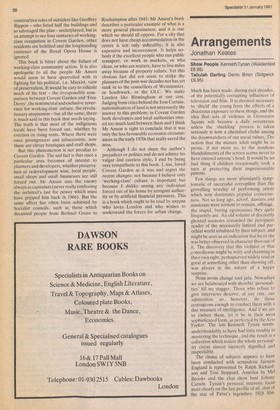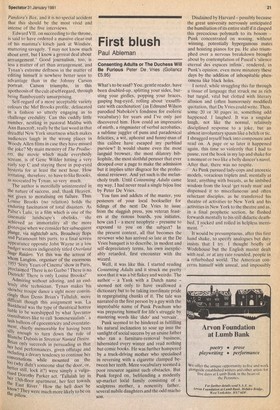Arrangements
Jonathan Keates
Show People Kenneth Tynan (Weidenfeld £8.95) Tallulah Darling Denis Brian (Sidgwick £6.95) Much has been made, during past decades, of the potentially corrupting influences of television and film. It is deemed necessary to 'shield' the young from the effects of a disastrous exposure to these things, and the idea that acts of violence in Grosvenor Square will become a daily occurrence unless the :shielding' process is taken seriously is now a cherished cliché among the doomwatchers of our social values. The notion that the mature adult might be as prone, if not more so, to the insidious blandishments of the screen seems never to have entered anyone's head. It would be no had thing if children occasionally took a turn at protecting -their impressionable parents.
Few things are more abundantly symptomatic of successful corruption than the grovelling Worship of .performing artists which now dominates popular consciousness. Not so long ago, actor, dancers and musicians were content to remain, offstage, the stupid, boring egomaniacs they quite frequently are. An old volume of discreetly ghosted memoirs reminded the percipient reader of the necessarily limited and parochial world inhabited by their subject, and might be seen as an indication that he or she was better observed in character than out of it. The discovery that this violinist or that comedienne might be witty and charming in their own right, perhaps even widely read or good at something other than showing off, was always in the nature of a happy surprise.
Nous avons change tout eela. Nowadays we are belaboured with showbiz 'personalities' till we stagger. Those who refuse to give interviews deserve, at any rate., our admiration: so, however, do those courageous enough to conduct them with a due measure of intelligence. And if we are to endure them, let it be in their most sophisticated form, as perfected by the New Yorker. The late Kenneth Tynan seems understandably to have had little trouble in mastering the technique, and the result is a collection which makes the whole personality circus almost Sinisterly dignified and respectable.
The choice of subjects appears to have been conducted with scrupulous fairness England is represented by Ralph Richardson and Tom Stoppard. America by Mel Brdoks and the chat show host Johnny Carson. Tynan's personal interests focus most clearly on the last profile of all, that of the star of Pabst's legendary 1928 film Pandora's Box, and it is no special accident that this should be the most vivid and intense of the five interviews.
Edward VII, on succeeding to the throne, is said to have ordered a massive clear-out of his mamma's'. kitsch junk at Windsor, muttering savagely. I may not know much about arrrt, but I know a grrreat deal about arrrangenaent.' Good journalism., too, is less a matter of art than arrangement, and Tynan's extreme deftness in the matter of editing himself is 'nowhere better seen to advantage than in the Johnny Carson portrait. Carson triumphs, in this apotheosis of the cult of selfiregard, through being flamboyantly unsurprising. Self-regard of a more acceptable variety colours the Mel Brooks profile, delineated in a fashion so utterly engaging as to challenge credulity. Can this cuddly little number, nestling in pastoral Malibu with Ann Bancroft, really be the last word in that dreadful New York smartness which makes audiences laugh in the wrong places in Woody Allen films in case they have missed the joke? My main memory of The Producers, the movie which made everybody scream, is of Gene Wilder hitting a very early top C and staying there in pop-eyed hysteria for at least the next hour. How irritating, therefore, to have to like Brooks, as recreated by Tynan, so very much, The author is mercifully uninterested in the nature of success, and, thank Heaven, not given to moralising on failure. Thus Louise Brooks (no relation) holds the enduring fascination of total disasters. As Pabst's Lulu, in a film which is one of the cinematic landscape's obelisks. she achieved an immortality all the more grotesque when we consider her subsequent Plunge, via nightclub acts, Broadway flops and Paramount bits parts, to a final screen appearance opposite John Wayne in a low budget western indigestibly titled Overland Stage Raiders. Yet this was the actress of Whom Langlois, organiser of the enormous 1955 "Sixty Years of Cinema' show in Paris, Proclaimed 'There is no Garbo ! There is no Dietrich! There is only Louise Brooks!' Admiring without adoring, and an endlesslY able technician, Tynan makes his showbiz troupe dance a sight more convincing!), than Denis Brian's Tallulah, more difficult though this assignment was. La .B. ankhead was the type of theatrical horror hable to be worshipped by what Spectator .contributors like to call tomosexualists', a lush balloon of egocentricity and overstate ent, chiefly memorable for having been enough to turn down the role of illariche Dubois in Streetcar Named Desire. rian 0,nly succeeds in persuading us that ner best performances, given offstage and cincluding a dreary tendency to continue her .0onversations while mounted on the ° (why didn't someone shut the door, or, rpetter still, lock it'?) were simply a vulga, rd Dorothy Parker act. 'Tallulah lay in t 13th-floor apartment, her feet towads the Last River. Flow the hell does he "',H0vv? They were much more likely to be on tne pillow.







































 Previous page
Previous page